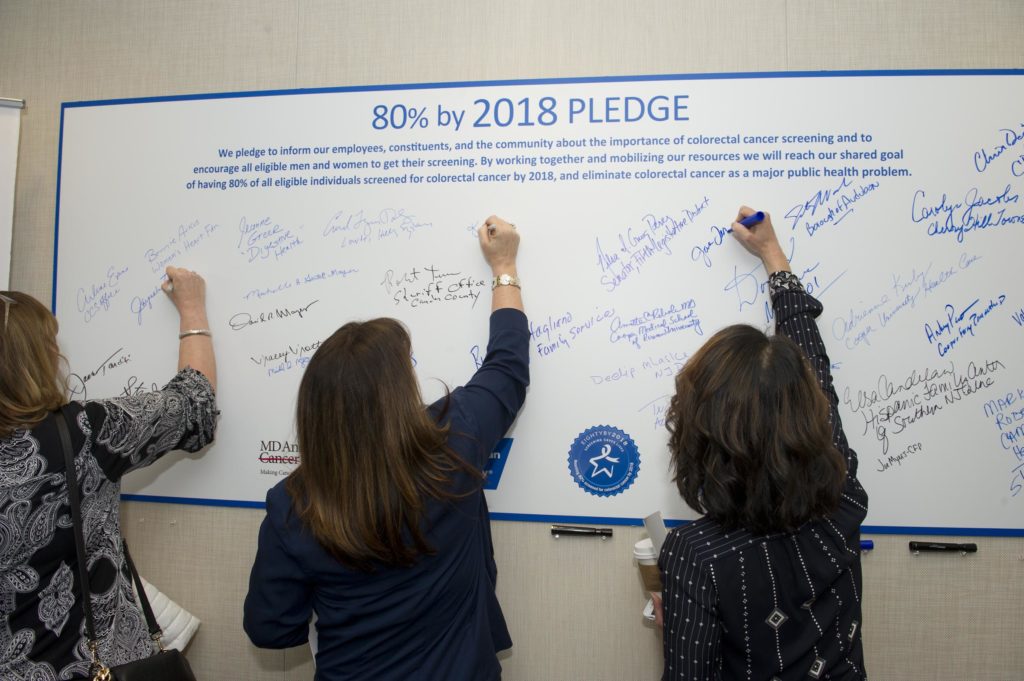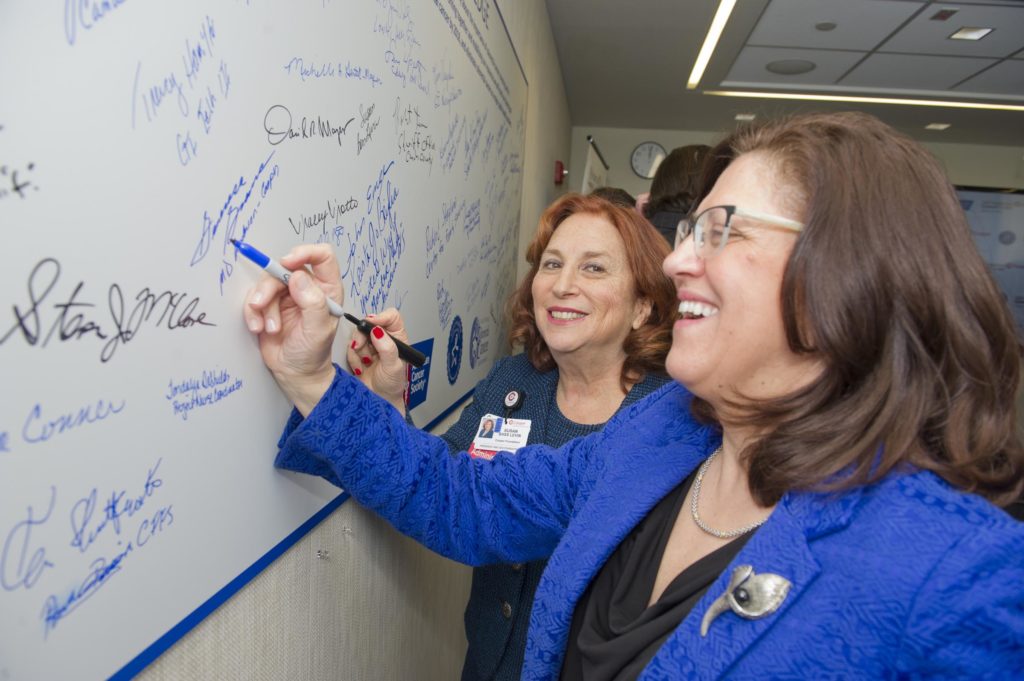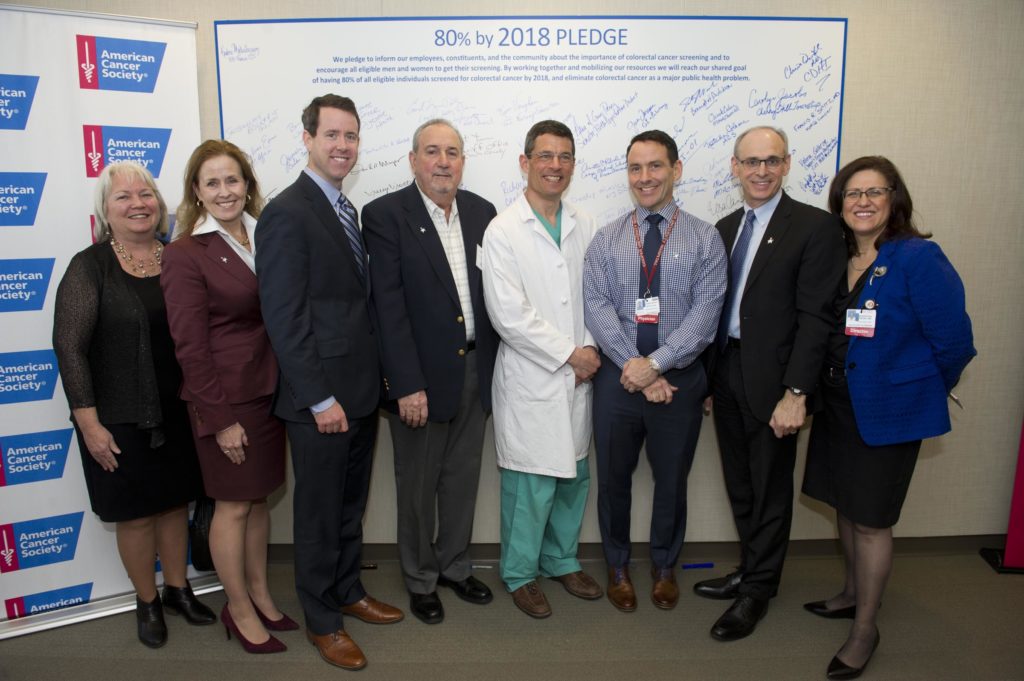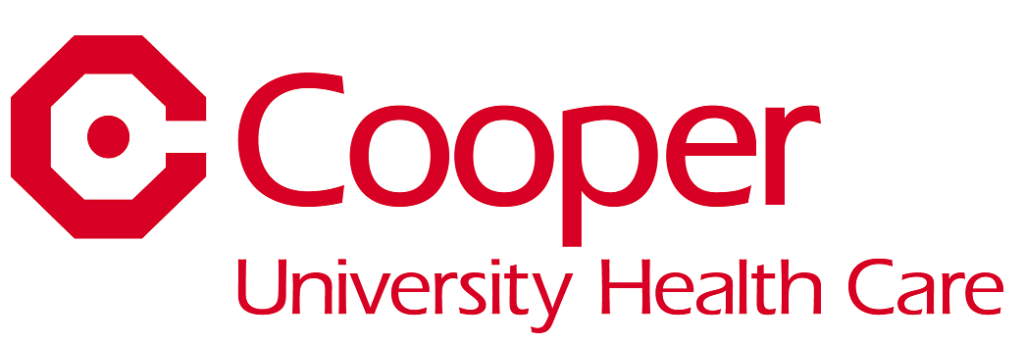Leaders sign pledge for national “80% x 2018” colorectal cancer screening campaign.

Adrienne Kirby, PhD, FACHE, President and CEO at Cooper University Health Care
With a swipe of a pen, South Jersey community leaders made history today as they announced their commitment to implement changes within their individual organizations that will increase colorectal cancer screening in Camden and surrounding areas.
According to the American Cancer Society, more than 135,000 people will be diagnosed with colorectal cancer in the United States this year, and over 50,000 will die from the disease. In fact, colorectal cancer is the nation’s third-leading cause of cancer-related deaths for both men and women and second-leading cause of cancer-related deaths when both sexes are combined, accounting for about 8 percent of all cancer deaths. In New Jersey, more than 4,000 people will be diagnosed with colorectal cancer this year, and over 1,420 will die from the disease.
 Today’s announcement celebrates the South Jersey health community’s commitment to achieve 80 percent by 2018; a shared goal led by the National Colorectal Cancer Roundtable (NCCRT). The Roundtable was started by the American Cancer Society and the Center for Disease Control and Prevention (CDC) in 1997. The NCCRT launched the 80% by 2018 campaign in 2014, and today more than 1,300 organizations across the country have pledged to support this public health goal.
Today’s announcement celebrates the South Jersey health community’s commitment to achieve 80 percent by 2018; a shared goal led by the National Colorectal Cancer Roundtable (NCCRT). The Roundtable was started by the American Cancer Society and the Center for Disease Control and Prevention (CDC) in 1997. The NCCRT launched the 80% by 2018 campaign in 2014, and today more than 1,300 organizations across the country have pledged to support this public health goal.
“Colorectal cancer is a major public health problem; and today, South Jersey community leaders have made an unprecedented commitment to increase colorectal cancer screening rates,” said Richard C. Wender, MD, chief cancer control officer for the American Cancer Society. “Working together to increase screening will ultimately prevent lives from being needlessly lost to colorectal cancer.”

(l-r) Susan Bass Levin, President and CEO of The Cooper Foundation, and Generosa Grana, MD, Director of the MD Anderson Cancer Center at Cooper.
“At Cooper, we are thrilled to continue to champion this cause to improve colorectal cancer screening rates,” said Generosa Grana, MD, Director of MD Anderson Cancer Center at Cooper. “We are asking all members of our community to come together and help us by getting screened and talking to your friends and family who are over 50 years of age about getting screened. Together, we can help to eliminate colorectal cancer as a major public health problem.”
The American Cancer Society recommends that every adult at average risk of developing colorectal cancer begin regular screening at age 50; screening needs to start earlier for people at increased risk (which includes having a personal or family history of colorectal cancer or polyps). People of all ages should talk to their family about colorectal cancer to rule out a family history of the disease, and talk with their doctor to determine if they have other risk factors. Anyone, regardless of age, should immediately contact their health care provider if any symptoms appear, such as blood in the stool or a persistent change in bowel habits.
For more information about colorectal cancer screening, please visit www.cancer.org/colon or contact the American Cancer Society at 1-800-227-2345. For more information about the 80% by 2018 initiative, visit www.nccrt.org.

(l-r): Bonnie Arkus, wife of patient Walter Arkus; Dr. Margaret Row, Vice President of Operations, MD Anderson Cancer Center Network; Michael E. Kwiatt, MD, surgeon, MD Anderson Cooper; Walter Arkus, patient; Steven J. McClane, MD, FACS, FASCRS, Head of the Division of Colorectal Surgery; Christopher W. Deitch, MD, Gastroenterologist, MD Anderson Cooper; Richard C. Wender, MD Chief Cancer Control Officer, American Cancer Society, Chair, National Colorectal Cancer Roundtable; Generosa Grana, MD, Director MD Anderson Cancer Center at Cooper.
About the American Cancer Society
The American Cancer Society is a global grassroots force of 2 million volunteers saving lives in every community. As the largest voluntary health organization, the Society’s efforts have contributed to a 25 percent decline in the cancer death rate in the U.S. since 1991, driven by less smoking, better treatments, and earlier detection. We’re finding cures as the nation’s largest private, not-for-profit investor in cancer research, ensuring people facing cancer have the help they need and continuing the fight for access to quality health care, lifesaving screenings and more. For more information, to get help, or to join the fight, call us anytime, day or night, at (800) 227-2345 or visit cancer.org.
About MD Anderson Cancer Center at Cooper
Cooper University Health Care and The University of Texas MD Anderson Cancer Center – the nation’s No. 1 cancer center – partnered in 2013 to create MD Anderson Cancer Center at Cooper. MD Anderson Cooper physicians adhere to the philosophy, process, and guidelines set by MD Anderson in Houston, Texas, and patients receive the same proven practice standards and treatment protocols provided at MD Anderson. Disease-site specific multidisciplinary teams consisting of physicians, nurses, and other clinical specialists work together to provide cancer patients with advanced diagnostic and treatment technologies, access to wide range of groundbreaking clinical trials and dynamic patient-physician relationships. A full complement of support services provides complete, compassionate care for our patients.
###
Desiree Berenguer Carton
American Cancer Society
973-703–3241
Desiree.Carton@cancer.org
Wendy A. Marano
Public Relations Manager, Cooper University Health Care
856-904-1688
marano-wendy@CooperHealth.edu



Recognizing 2017 Achievements Through American Cancer Society and MD Anderson Cancer Center at Cooper Collaborations – Inside Cooper
[…] leadership, strategic planning, advocacy and access to colorectal cancer screening services. MD Anderson Cooper engaged more than 25 community partners in both Camden County and Burlington County to increase screening rates in our […]